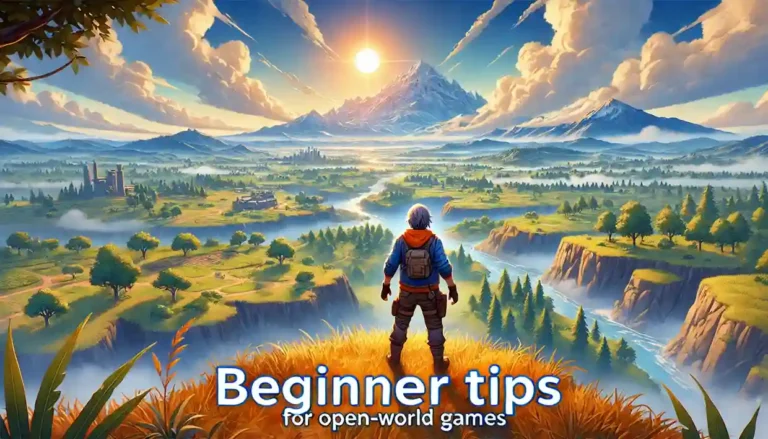Introduction
Diving into an open-world game for the first time can be both thrilling and a bit overwhelming. With vast landscapes, countless quests, and so much freedom, it’s easy to get lost or not know where to start. But don’t worry—whether you’re exploring fantasy lands, post-apocalyptic wastelands, or futuristic cities, there are beginner tips for open-world games that can help you make the most of your experience. In this guide, we’ll cover essential tips for new players, from planning your path to making the best use of your resources. Let’s get you ready to explore like a pro!
Why Open-World Games are Unique
Open-world games are designed to give players freedom, offering vast, explorable worlds with endless possibilities. Unlike linear games where you follow a set path, open-world games let you choose your journey, interact with various characters, and tackle quests in any order. This freedom can be exciting, but it also means there’s a lot to learn. The tips below will help you navigate this unique genre and get the most out of your gameplay.
Essential Beginner Tips for Open-World Games
Here are some beginner-friendly tips that’ll make your open-world gaming experience smoother, more enjoyable, and less intimidating.
1. Don’t Rush the Main Storyline
In open-world games, it’s tempting to jump straight into the main storyline. However, these games are packed with side quests, hidden treasures, and optional activities that add depth to the story. Spend some time exploring before focusing solely on the main story. You’ll often find valuable rewards, level up faster, and learn more about the game’s world and lore.
2. Take Advantage of Fast Travel, But Don’t Overuse It
Most open-world games have a fast-travel system, allowing you to teleport to previously visited locations. While it’s great for saving time, overusing it can make you miss out on discovering hidden paths, treasures, and unique encounters. Try balancing fast travel with exploring on foot or by vehicle to fully experience the world around you.
3. Mark Important Locations on the Map
Open-world maps are huge, and it’s easy to lose track of key locations. Use the map markers to tag places like vendors, crafting stations, and points of interest. This helps you navigate back to them without wasting time searching. Many games allow you to place custom markers, so make use of this feature to keep track of places you want to revisit.
4. Loot Everything (Within Reason)
Looting is a big part of open-world games, and you’ll often find items hidden in chests, boxes, or dropped by enemies. Pick up whatever you find, especially at the beginning, as even seemingly useless items can sometimes be sold or crafted into something valuable. However, be mindful of inventory space—many games have limited space, so try to keep your inventory organized by discarding or selling items you don’t need.
5. Level Up Strategically
Most open-world games have a leveling system that allows you to improve your character’s skills and abilities. When leveling up, think about your preferred playstyle. Do you want to focus on combat, stealth, or magic? Invest points in skills that align with how you want to play. Strategic leveling will make the game easier and more enjoyable as you build a character that suits your style.
6. Use Stealth When Possible
In many open-world games, direct combat isn’t always the best option. Stealth can help you avoid fights, gather intel, or even take down enemies without alerting others. Try using cover, crouching, and silenced weapons (if available) to get around undetected. Stealth tactics can make missions easier and sometimes unlock additional rewards.
7. Save Often
In open-world games, unexpected things can happen—an enemy ambush, a failed mission, or even a glitch. Save your progress regularly, especially before big encounters or challenging quests. Many games have autosave, but it’s still a good habit to create manual saves in case you need to backtrack.
8. Experiment with Different Weapons and Abilities
Open-world games often provide a range of weapons and abilities to choose from. Don’t stick to just one weapon or ability. Try different combinations to see what works best for different scenarios. Some enemies may be weak to specific weapons, or certain abilities may make missions easier. Experimenting will help you understand the game’s mechanics better.
9. Interact with NPCs (Non-Player Characters)
NPCs in open-world games are more than just background characters. They often provide valuable information, offer side quests, and sometimes even give you free items. Take the time to talk to NPCs whenever you’re in a new area—they can help you uncover hidden opportunities and expand your understanding of the game’s story.
10. Don’t Ignore Side Quests
Side quests in open-world games are a great way to earn extra experience points, rewards, and sometimes rare items. They also add depth to the game’s storyline and let you explore different areas you might not see in the main quest. Plus, they’re often fun and introduce you to unique characters and interesting challenges.
Read also: Complete Beginner’s Guide to Streaming Games on Twitch and YouTube [2024]
Common Mistakes Beginners Should Avoid
Let’s quickly cover some common mistakes that beginners make in open-world games so you can avoid them:
- Focusing Only on the Main Quest: You’ll miss a lot of content if you ignore side quests and exploration.
- Not Managing Inventory: Don’t hoard items you don’t need—sell or discard them to keep your inventory manageable.
- Skipping Tutorials: Tutorials exist for a reason! They teach you game mechanics, which are crucial for mastering the game.
- Ignoring the Map: Failing to mark important locations will make it harder to navigate and find key areas.
- Underestimating Enemies: Some games have tough enemies that require strategy. Don’t charge in blindly.
How to Stay Engaged in an Open-World Game
Open-world games are exciting, but they can be overwhelming. Here are some tips to keep the experience fresh and engaging:
- Set Small Goals: Instead of trying to do everything, set small goals for each play session, like completing a few side quests or exploring a new area.
- Switch Up Your Playstyle: If you’re feeling stuck or bored, try changing your approach. Experiment with different combat styles, weapons, or skills.
- Take Breaks: Open-world games can be intense. Take breaks to avoid burnout and come back feeling refreshed.
- Play With Friends (If Possible): Some open-world games have multiplayer options. Playing with friends can add a new layer of fun and teamwork.
FAQs About Beginner Tips for Open-World Games
1. Do I need to complete every side quest?
No, side quests are optional. They’re great for rewards and story depth, but you don’t have to complete all of them.
2. What’s the best way to level up in open-world games?
Complete a mix of main quests, side quests, and challenges. This provides balanced experience points and keeps gameplay diverse.
3. Can I play an open-world game at my own pace?
Absolutely! Open-world games are designed for you to explore and play at your own speed. Take your time and enjoy the journey.
4. Are there open-world games that don’t require combat?
Yes, some open-world games focus on exploration, story, and puzzles rather than combat. Examples include The Legend of Zelda: Breath of the Wild and Minecraft (exploration mode).
5. Do I need to finish every game objective?
No, open-world games are about freedom. You don’t have to finish everything; focus on the aspects you enjoy.
Conclusion
Open-world games offer a unique experience where you have the freedom to explore, interact, and make choices that shape your adventure. These beginner tips for open-world games are designed to help you navigate these vast worlds confidently, allowing you to fully enjoy every moment without feeling overwhelmed. So, the next time you boot up an open-world game, keep these tips in mind, take your time, and enjoy the endless possibilities. Happy exploring!

